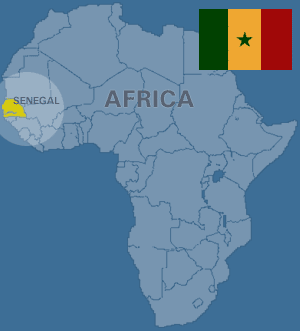
We have been keeping tabs on SCHOTT solar for a while now. Besides being a big mover in solar, solar thermal electricicy, and an array of other renewable energy projects they also have an active program of social giving. Thanks to solar modules made by SCHOTT Solar in Germany, the doctors, nurses and patients in a rural hospital in Senegal will no longer have to worry about lighting and refrigeration. A new solar energy system donated and made by SCHOTT Solar in Alzenau will ensure a steady supply of power.
Up until now, hospital employees were forced to deal with power outages several times a day. Refrigeration for medicines was interrupted repeatedly, lights went off and what little medical equipment was available was out of commission. Now, with the photovoltaic system from SCHOTT Solar as a backup system, a secure supply of electricity is guaranteed.
The hospital in Baila, located in the southern province of Casamance in Senegal, includes an emergency room, ten beds, a delivery room and accommodation for relatives. This center has provided medical attention to people in the immediate region for years. In order to protect the hospital against power outages on the regular network, a five-kilowatt solar power system is now being installed. The power from the solar modules is loaded into batteries and if the regular power system fails, the network reverts virtually instantaneously to a so-called mini-grid, which provides the hospital with an independent source of power.

Four parties have made the installation possible: in addition to the solar modules, SCHOTT Solar supplies the system technology and supports the installation of the system. Most of the costs have been carried by the company itself, with a portion contributed by employees as a project for Corporate Social Responsibility (CSR). KAÃTO Energie AG takes responsibility for project management on location and deals with the local authorities. SCHOTT Solar is responsible for the electrical installation and the technical certification of the backup system.
The village community built the extension on which the system was installed in May. Involving the people in the village in the technical and electrical building works contributes significantly to the acceptance of the solar energy installation. KAÃTO includes apprentices from a neighboring vocational school in the mechanical installation of the solar system, providing them practical experience and allowing them to test their own skills with modern technology.
In mid-March, the modules were shipped out via Dakar to the regional harbor at Ziguinchor in Casamance and then were transported overland to Baila. In Casamance, located on the edge of the tropical rainforest, climatic conditions are extreme, with heavy rainfall.
Following the dry season from November to June, hot monsoon winds bring rain and high humidity from the south. That’s why the SCHOTT Solar double-glazed modules are perfect for Baila; they have been proven under difficult weather conditions. The company regularly tests its modules under extreme temperature fluctuations, permanent humidity, high pressure and suction – and according to the information SCHOTT Solar has, the company is the only manufacturer who has criteria that are double as strict as those stipulated by the IEC 61215 standard.

The project in Baila shows that solar energy is a key to providing electricity in Africa. And a reliable source of power is vital to sustainable development. In rural areas in particular, the power supply is neither full-coverage nor stable – but there is a lot of sun. These are ideal conditions for photovoltaic systems, which guarantee a reliable source of electricity, either as an isolated system or even to provide first access to power in remote regions.
“The SCHOTT Group sees the sustainable improvement of people’s living conditions as one of its tasks. Electricity is the prerequisite for education and development – and our projects contribute toward electrifying Africa,” observed Dr. Martin Heming, managing director of SCHOTT Solar and member of the SCHOTT Group management board. Senegal is now investing more in renewable energies, and in decentralized solar power in particular. Up until now, the programs in Senegal were primarily KfW (Reconstruction Loan Corporation) and individual World Bank projects.